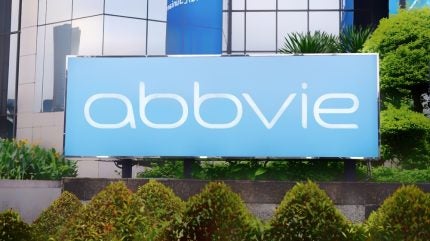
AbbVie has announced positive data for its antibody-drug conjugate (ADC) therapies, Teliso-V, ABBV-400 and ABBV-706, from Phase I and II trials in solid tumour indications.
The results were presented during the ongoing American Society of Clinical Oncology (ASCO) annual meeting taking place in Chicago until 4 June.

Discover B2B Marketing That Performs
Combine business intelligence and editorial excellence to reach engaged professionals across 36 leading media platforms.
The company presented data from Phase I trials of ABBV-400 and ABBV-706 (NCT05029882 and NCT05599984) in patients with c-Met overexpressing advanced colorectal cancer and solid tumours, respectively. AbbVie also released primary analysis from the Phase II LUMINOSITY trial (NCT03539536) investigating Teliso-V in patients with c-Met overexpressing advanced non-small cell lung cancer (NSCLC).
“ADCs form a core part of our differentiated solid tumour pipeline. We have extensive experience and significantly differentiated capabilities in this space that was further bolstered with the acquisition of ImmunoGen,” said Dr. Daejin Abidoye, head of solid tumour oncology, development at AbbVie in an interview with Clinical Trials Arena.
“Teliso-V is our most advanced c-Met targeted ADC in development,” said Dr. Abidoye. “c-Met protein overexpression is far more common than MET mutations or amplifications. It is also associated with poor prognosis and there are currently no approved cancer therapies specifically for this patient population,” added Dr. Abidoye.
The LUMINOSITY study enrolled 172 patients with c-Met protein overexpression, epidermal growth factor receptor wild type, advanced/metastatic non-squamous NSCLC. The Teliso-V results demonstrated a mean overall response rate (ORR) of 28.6%, with an ORR of 34.6% and 22.9% in c-Met high and c-Met intermediate patients, respectively. The therapy demonstrated a median duration of response (DOR) of 9 and 7.2 months in c-Met high and c-Met intermediate patients, respectively.

US Tariffs are shifting - will you react or anticipate?
Don’t let policy changes catch you off guard. Stay proactive with real-time data and expert analysis.
By GlobalDataThe commonly observed side effect was peripheral sensory neuropathy. Two grade 5 adverse events (AEs) resulting in death occurred during the trials due to interstitial lung disease and respiratory failure.
ABBV-706 is an ADC targeting SEZ6, a transmembrane protein expressed in various solid tumours, conjugated to a topoisomerase 1 inhibitor payload. The therapy was evaluated as a monotherapy and in combination with AbbVie’s investigative programmed cell death 1 (PD-1) inhibitor, budigalimab along with chemotherapies carboplatin or cisplatin in a Phase I trial (NCT05599984). The study enrolled 49 patients, of which 22 had small cell lung cancer (SCLC), five had central nervous system tumours and the remaining 22 had neuroendocrine neoplasms.
Two of the trial participants had dose-limiting toxicities, with one experiencing grade 4 leukopenia and neutropenia that lasted for over seven days at 3 mg/kg, the maximum tolerated dose, and another having a grade 4 thrombocytopenia at 3.5 mg/kg. Treatment emergent adverse events (TEAE) occurred in 92% of the trial participants, with low blood counts being the most commonly observed TEAEs.
ABBV-400 is an ADC comprising of c-Met–targeting antibody telisotuzumab conjugated to a novel topoisomerase 1 inhibitor payload. The dose escalation Phase I trial (NCT05029882) evaluated ABBV-400 in 122 patients with solid tumours. As of October 2023 data cut-off, an increased ORR of over 30% was observed at doses of ≥2.4 mg/kg. Commonly observed adverse events were low blood counts, including anaemia, with 11 patients discontinuing the study due to TEAEs.
Multiple companies presented data for their ADC therapies at ASCO. MSD released positive data from Phase II and III trials for its ADC therapy, sacituzumab tirumotecan, in lung and breast cancer indications, respectively. MediLink Therapeutics and BioNTech also presented data from the Phase I trial of its HER3 ADC therapy in patients with EGFR-mutated NSCLC.





